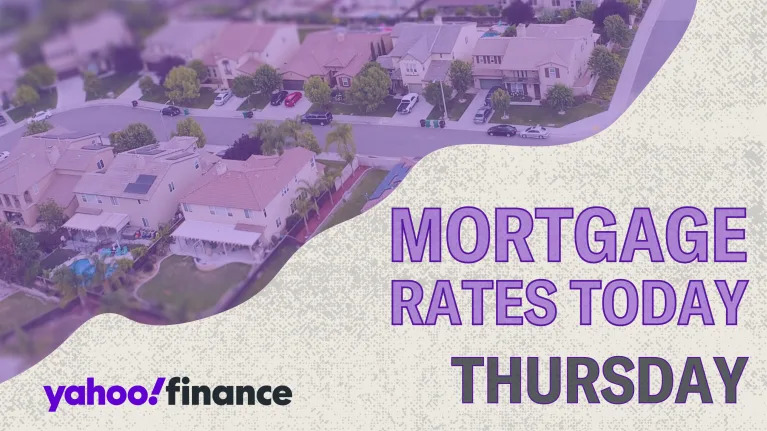Since late 2022, mortgage rates have jumped to between 6% and 7%. Rates started to drop this summer in anticipation of the Federal Reserve cutting the federal funds rate by 25 basis points at its Sept. 18 meeting.
The Fed did indeed announce a rate decrease at the September meeting, then again at its November meeting. Many expected mortgage rates to start falling in response to the Fed’s rate cuts — but for the most part, mortgage interest rates have been increasing. This is due in part to a strong economy and an increasing 10-year Treasury yield. So, when will mortgage rates go down significantly enough to make monthly payments more affordable?
Dig deeper: When will the housing market crash again?
In this article:
Yes and no. Let’s start with the good news.
Yes, mortgage rates have decreased significantly since autumn 2023. According to Freddie Mac, in late Nov. 2023, the 30-year fixed mortgage rate was 7.29%, and the 15-year fixed rate was 6.67%. Both rates have dropped by over 40 basis points since then.
Now for the bad news: No, mortgage rates have not been decreasing since the Fed’s first rate cut in September. In fact, rates have been rising.
Basically, shorter-term rates have increased, but the longer-term interest rates have decreased.
To gauge when mortgage rates will go down more dramatically, it’s important for home buyers to understand why they increased in the first place.
For the most part, the rising mortgage rates were tied to inflation. As inflation rose, the Federal Reserve pushed up its interest rates to tamp down spending. The central bank increased its benchmark federal funds rate — the rate at which banks borrow money from each other — 11 times throughout 2022 and 2023, raising it from nearly 0% to the range of 5.25% to 5.50%.
Finally, the Fed cut the federal funds rate again at its meeting on Sept. 18, 2024, to 4.75% to 5.00%. At its November meeting, the central bank decreased the rate again to 4.50% to 4.75%. Mortgage rates aren’t directly tied to the Fed rate, but the two are correlated. Typically, mortgage rates increase when the Fed implements rate hikes and decrease when it enforces rate cuts.
Now that the fed funds rate is down, buyers may expect mortgage rates to keep dropping too. But the anticipation of the September rate slash had already pushed rates down before the Fed announcement even happened. People also expected the November rate cut and knew it would be smaller, which kept rates from decreasing.
Mortgage rates probably won’t plummet in the last few weeks of 2024 unless the Fed throws us a curveball, such as slashing its rate even more than expected at its December meeting.
In September, the Fed indicated it planned to cut its rate several times throughout 2025, leading many to believe mortgage rates would drop next year. Now that Trump has won the presidential election, some economists expect inflation to rise and for the 10-year Treasury yield to stay high. So, it will probably be longer than we thought before rates significantly decrease.
How long? It’s too soon to say — but the experts have some thoughts.
Dig deeper: How the Federal Reserve impacts mortgage rates
No crystal ball will tell us when to expect mortgage rate cuts, and rate predictions largely depend on who you ask.
According to its November forecast, the government-sponsored enterprise (GSE) Fannie Mae predicts 30-year mortgage rates will be at 6.60% by the end of 2024 and 6.30% by Q4 2025. In its October report (before the presidential election results), Fannie Mae’s forecast put Q4 2024 rates at 6% and Q5 2025 rates at 5.60%.
The Mortgage Bankers Association (MBA) November forecast is similar. The MBA expects the 30-year rate will end 2024 at 6.60%, then reach 6.40% by Q4 2025. Last month, the MBA predicted mortgage rates would end this year at 6.30% and 2025 at 5.90%.
All that to say, economists’ expectations are far less optimistic than just a month ago. Yes, rates could go down in 2025, but not as drastically as once thought.
Fannie Mae and the MBA have also released mortgage interest rate predictions for 2026. Fannie Mae expects rates to end 2026 at 6.10%, while the MBA forecasts 6.30%.
Dig deeper: What determines mortgage rates? It depends.
Mortgage rates are lower than this time last year. They will probably decrease in 2025, but the changes might not be as significant as people once hoped. So, is it worth it to hold out for lower rates? The answer is different for everyone, but to start, run the numbers.
“For people waiting for rates to come down, I often show the payment now versus a percent lower,” Jennifer Beeston, senior vice president of mortgage lending at Rate (previously Guaranteed Rate), said via email. “They are often shocked by how little the difference is. The impact of a rate drop on your payment is far more dramatic at a $1 million purchase than a $100,000 one.”
Below is an example of what a rate drop may mean for your mortgage payment toward the principal and interest on a $250,000, $500,000, or $1 million mortgage.
Read more: How much is a mortgage on a $500,000 house?
That said, the average American might not even see rates below 6% in the next year or two.
Beyond this, you should also think about housing market conditions. Though lower mortgage rates could shave a little off your monthly payment, there may be more competition for properties when rates fall. This could cause home prices to increase and result in bidding wars (which also drive up prices).
“Home prices aren’t likely to come down in any significant way, and while rates may decline, this will likely only lead to more people getting into the market and creating greater demand for housing — pushing home prices up all over again,” said Evan Luchaco, a home loan specialist at Churchill Mortgage in Portland, Ore., via email.
That’s why most experts recommend buying a home when the time — and numbers — work for you. If you need to get out of the rent race and can qualify for a rate and payment you can afford, take the plunge, experts say. You can plan to refinance if rates drop later on.
“From where I sit, the cost of waiting will continue to hurt the buyer, even in today’s rate environment,” said Neil Christiansen, a home loan specialist at Churchill Mortgage in Denver, Colo., in an email. “The longer the buyer waits, the more they lose the opportunity to improve their net worth.”
If you buy sooner rather than later, you have a chance to start building home equity.
Dig deeper: Which is more important, your interest rate or house price?
While average 30-year fixed mortgage rates sit a little over 6.80% right now, the exact rate you’ll get on a mortgage depends on many factors, like your loan amount, credit score, mortgage lender, and more.
To ensure you’re getting the best mortgage rate possible, compare mortgage lenders. Get a Loan Estimate from each, and see how rates and fees measure up. According to Freddie Mac, shopping around can save you between $600 and $1,200 per year.
You can also work on improving your credit score since borrowers with higher scores tend to get lower interest rates.
Finally, consider an interest rate buydown. When you buy down your rate, you either permanently or temporarily lower your interest rate in exchange for an up-front fee on closing day. Talk to your mortgage loan officer if you’re interested in this strategy.
Learn more: 5 strategies to get the lowest mortgage rates
Yes, expert sources Fannie Mae and the Mortgage Bankers Association predict mortgage rates decline a little in 2024, 2025, and 2026 — but current forecasts don’t even see interest rates falling below 6% in the next few years.
Mortgage rates went down earlier in 2024, but they probably won’t drop much more before the end of the year. They’ve actually been increasing for several weeks now.
Mortgage rates have only ever been at 3% or lower in extreme times, specifically during the peak of the COVID-19 pandemic. Economic conditions would need to deteriorate significantly for rates to fall that low again.
There are no sources for officially projected interest rates in five years, but the Mortgage Bankers Association has published predictions through 2027. The MBA expects 30-year fixed rates to be at 6.30% in 2027.
Although mortgage rates are down since this time last year, they have mostly been increasing since September.
This article was edited by Laura Grace Tarpley.
EMEA Tribune is not involved in this news article, it is taken from our partners and or from the News Agencies. Copyright and Credit go to the News Agencies, email news@emeatribune.com Follow our WhatsApp verified Channel





